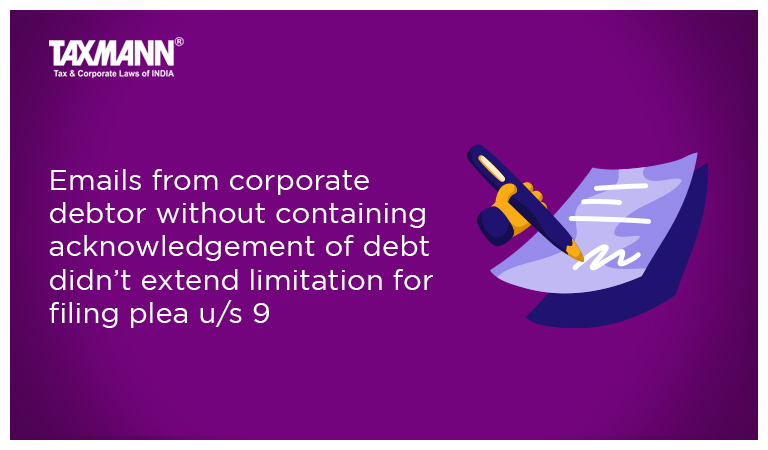Emails from corporate debtor without containing acknowledgement of debt didn’t extend limitation for filing plea u/s 9
- Blog|News|Insolvency and Bankruptcy Code|
- 2 Min Read
- By Taxmann
- |
- Last Updated on 20 July, 2022

Case Details: Mohan Lal Goel v. National Skill Development Corporation - [2022] 140 taxmann.com 144 (NCLAT-New Delhi)
Judiciary and Counsel Details
-
- Justice Ashok Bhushan, Chairperson, Dr Alok Srivastava & Shreesha Merla, Technical Member
- Suraj Kr. Vishwakarma & Neeraj Kr. Gupta, Advs. for the Appellant.
- Ms Gunjan Sinha Jain & Ms Aparna Gupta, Advs. for the Respondent.
Facts of the Case
In the instant case, an appeal was filed against the order passed by the Adjudicating Authority (NCLT), by which an application made by the appellant as an Operational Creditor u/s 9 of the IBC, 2016 was rejected on the ground that the application was time-barred.
The appellant was an employee of the corporate debtor. The appellant sent a demand notice u/s 8 of the IBC, 2016 demanding salary for the unpaid notice period. Thereafter, the appellant filed an application u/s 9 of the IBC, 2016 on 13.03.2020 for the default dated 30.12.2016.
The Adjudicating Authority (NCLT) rejected the said application holding that the same was barred by limitation. Thereafter, an appeal was made to the National Company Law Appellate Tribunal (NCLAT) against the order passed by the National Company Law Tribunal (NCLT).
The appellant submitted that the Adjudicating Authority committed an error in not considering the acknowledgment which was received by the appellant giving the benefit of Section 18 of the Limitation Act. Further, he submits that the period of limitation got extended by virtue of e-mails that were sent on 26.03.2017 and 27.04.2017. As per the appellant, these emails amount to an acknowledgement of debt.
NCLAT Held
The NCLAT observed that it had been clearly mentioned that debt fell due on 30.12.2016 whereas the application was filed beyond three years from the date when the debt fell due.
The submission which was pressed by the appellant was regarding extension of limitation by virtue of the e-mails dated 26.03.2017 and 27.04.2017. The NCLAT held that since the said e-mails didn’t contain any acknowledgement, which could be read as an acknowledgement of accepting debt within the meaning of section 18 of the Limitation Act.
Further, the NCLAT held that since section 18 of the Limitation Act had no applicability in the instant case, an application filed u/s 9 of the IBC by the appellant could not have been entertained and had been rightly rejected by the NCLT.
Accordingly, the appeal was to be dismissed.
List of Cases Reviewed
-
- Order of NCLT – New Delhi dated 1-12-2021 (para 10) affirmed.
Disclaimer: The content/information published on the website is only for general information of the user and shall not be construed as legal advice. While the Taxmann has exercised reasonable efforts to ensure the veracity of information/content published, Taxmann shall be under no liability in any manner whatsoever for incorrect information, if any.

Taxmann Publications has a dedicated in-house Research & Editorial Team. This team consists of a team of Chartered Accountants, Company Secretaries, and Lawyers. This team works under the guidance and supervision of editor-in-chief Mr Rakesh Bhargava.
The Research and Editorial Team is responsible for developing reliable and accurate content for the readers. The team follows the six-sigma approach to achieve the benchmark of zero error in its publications and research platforms. The team ensures that the following publication guidelines are thoroughly followed while developing the content:
- The statutory material is obtained only from the authorized and reliable sources
- All the latest developments in the judicial and legislative fields are covered
- Prepare the analytical write-ups on current, controversial, and important issues to help the readers to understand the concept and its implications
- Every content published by Taxmann is complete, accurate and lucid
- All evidence-based statements are supported with proper reference to Section, Circular No., Notification No. or citations
- The golden rules of grammar, style and consistency are thoroughly followed
- Font and size that’s easy to read and remain consistent across all imprint and digital publications are applied



 CA | CS | CMA
CA | CS | CMA
